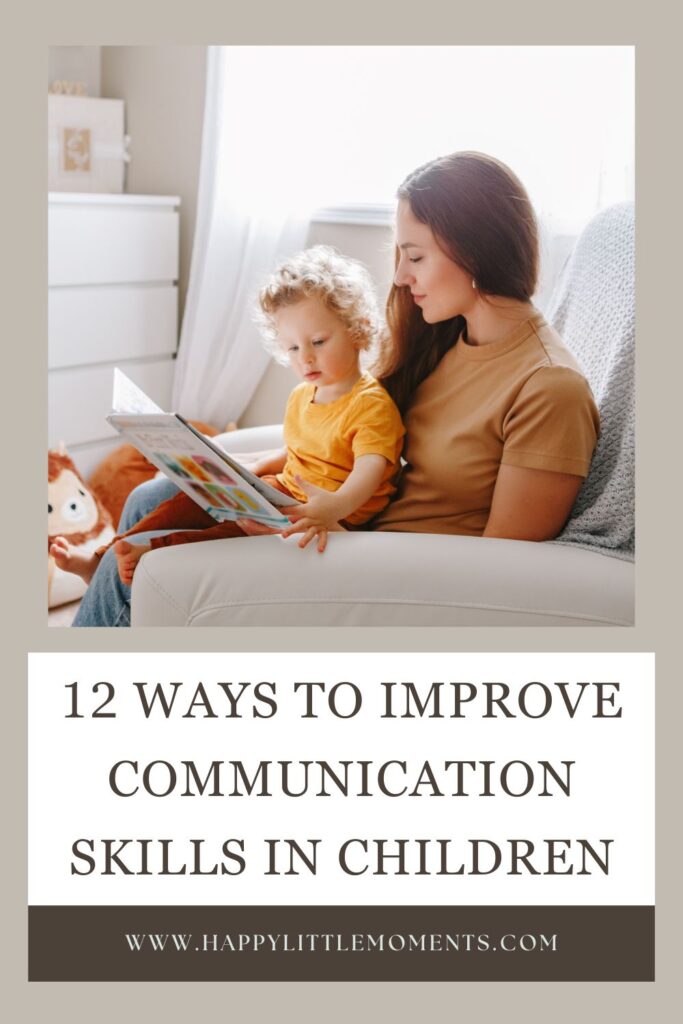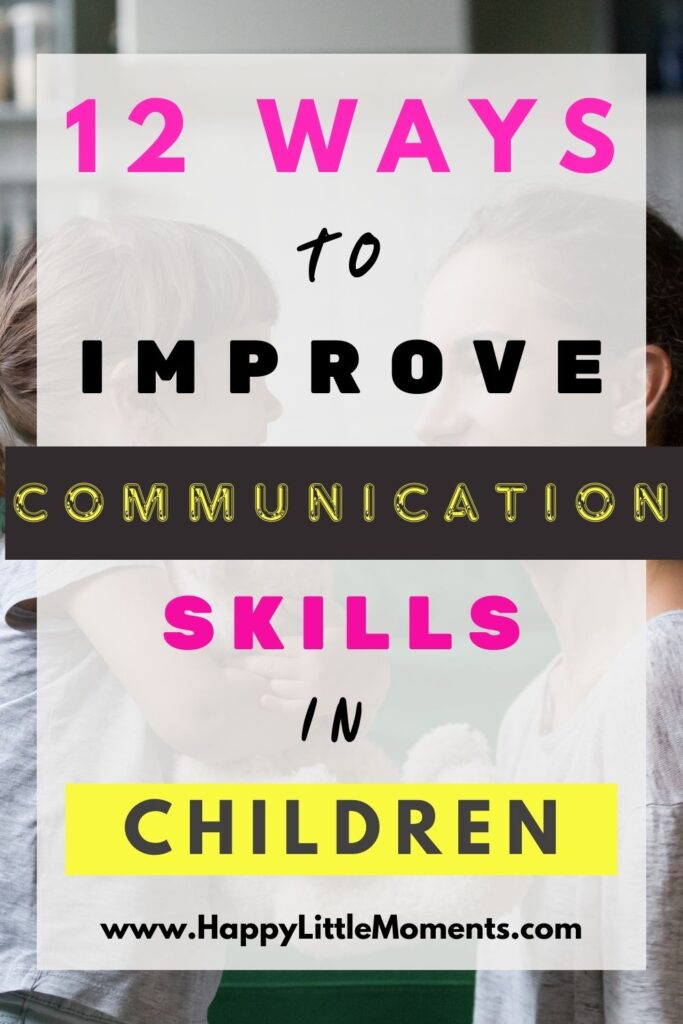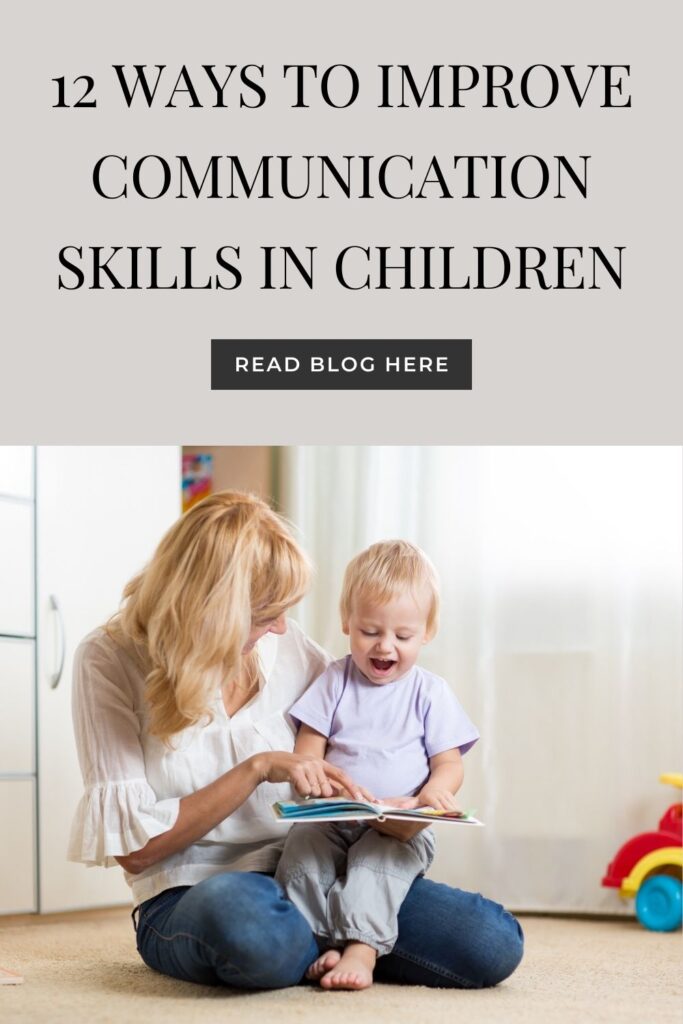happy little moments





12 Ways to Improve Communication Skills in Children
Working in the field of early learning, we are often asked by parents how to improve communication skills in children – especially toddlers and preschoolers. Many parents are concerned about their child’s vocabulary, how well they are pronouncing words, and how effectively they are able to communicate. First of all, imagine being a small child and not being able to adequately communicate what you would like or what you need at any given moment. With my own children, when they are trying to communicate with me (and not always in the best manner), I remind myself that their language skills are not nearly as robust as mine. They don’t have the large vocabulary of an adult or the nuance experience gives. Thus, we need to be mindful as adults to respond to our children with empathy when they are unable to communicate with us the way we would like.
The good news is, there are many ways to help our children with their communication skills, and often quite quickly. Children are amazing and usually pick up new skills much faster than anticipated. I’m happy to share some ideas we do at home and things we do at our child care center to improve communication skills in children.
Enhancing Communication Through Everyday Interactions
1). When your child is at home with you, talk with your child constantly. It may feel awkward initially (especially with infants) but do it anyway. Narrate your day to them and almost everything you are doing. Narrate their day to them and explain to them what they are doing. For instance, if you’re feeding them lunch, talk about the food they are eating. Use descriptive words such as juicy, squishy, crunchy, soft, or bumpy. Use lots of words. Remember, words repeated over and over will get memorized and will become part of their future vocabulary.
2). With your baby and young toddlers, imitate their cooing and baby syllables to make conversation with them. As they get older, help fill in the conversational gaps and converse with real words, too. Even if what they’re saying doesn’t make sense, include them in the back-and-forth pattern of conversation from early in their development. All of this helps with language and social skills, as well as helps your child learn new words, sounds, and syllables.
3). Take out old photo albums (or the thousands of photos on your phone) and talk about the people in the photos, especially if they’re your children. Discuss the experiences and memories you made in the photos.
4). When your child says a phrase or sentence incorrectly, don’t make a big deal of correcting their error. If they sense they made a mistake, they may be shy of saying words in the future. Instead, simply repeat what they said in a more correct manner.
Improving Communication Skills in Children Through Music
5). Sing songs and nursery rhymes with your children. Singing slows down language so it’s easier for your child to learn each syllable. Music also makes words easier to remember. Rhyming and rhythmic patterns become necessary for future reading skills. There’s so much children learn from music and singing. Even if you’re not a great singer, your child will still learn from singing songs with you.
6). If your child is an infant or toddler, it’s been studied that the “sing-song” language we often use with infants has a purpose. It’s not just the voice we use because the baby is so cute! Using a sing-song voice slows down language for your baby, making it easier for them to understand. Infants also hear the higher pitch of this voice much easier, and stretching out the words helps them pick up on language patterns and rhythms more easily.
There is a caveat to the sing-song voice: Don’t use this type of voice ALL the time with your baby. It’s essential for them to hear regular language, too, especially as they become toddlers and preschoolers. We don’t want them to only pick up on baby talk, so use your sing-song voice with moderation.

Improving Communication Skills through Early Literacy Skills
7). Take your child to the library. Reading a variety of age-appropriate library books promotes your child’s early literacy skills, vocabulary, reading comprehension, and listening skills. Engaging with books and storytelling lays the foundation for reading and writing. Visits to the library also encourages a love of reading from a young age, as children get to choose their own books and participate in storytime sessions.
8). Read before bedtime. Spending just 20 minutes before bed reading to your child makes a world of difference in your child’s vocabulary and academic success in school. Simply having exposure to language each day adds up because in books, they are exposed to words we may not use in every day life. If you’d like to read more about the benefits of reading to your child, check out these 2 blog posts:
The Benefits of Reading with Children: Sparking Lifelong Adventures in Learning
The Bedtime Story Advantage: Why Reading to Your Child Matters
9). When reading to your child, discuss the pictures in the story. Ask your child open-ended questions about the characters to improve memory and comprehension. Point to the words in the text so your child begins to associate the letters and patterns with the words you are speaking.
10). Tell stories to your child, or better yet, create outrageous stories with your child. Be silly and see what you come up with together. It takes practice to develop your goofiest improv chops, but it’s so much fun to make up stories about crazy ideas, like purple monsters made out of cotton candy.

Improving Communication Skills in Children Through Play
11). Let your child have sensory experiences with sand, play-dough, clay, rice, etc. Help them understand the words for what they are feeling and touching. Play with various objects and toys in the sand and be creative.
12). Give your child lots of experiences. These experiences don’t have to be expensive. You can take them to the library, grocery store, zoo, aquarium, or science center. You can even bake, hike, take a walk, or garden with them to get these benefits, too. The best way to get the most out of these experiences is to talk about what you are seeing and experiencing. Take time with your child as you go through these activities and spend time conversing.
In Conclusion
I hope you find these suggestions helpful in building communication skills in children. There is quite a bit to take in, so feel free to start with just one or two ideas and build from there. If you’re wondering where to begin, I recommend reading to your child every night before bed and engaging them in conversations by narrating your day-to-day activities.
It’s important to remember that children progress at their own pace. Many parents notice gradual changes, while others experience sudden leaps in their child’s vocabulary. If you ever feel concerned about your child’s language development, don’t hesitate to talk to your child’s pediatrician. They can provide guidance on what to expect for their age and reassure you about their growth.
Save this post for later! Click below to save to your Pinterest Account!



